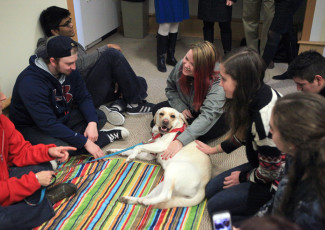Military Community Is at the Center of College’s Mission
By Sonya Stinson
October 5, 2015
Tidewater Community College in Norfolk, Virginia, supports regional needs with dedication to students.
As a neighbor of Naval Station Norfolk — the world’s largest naval facility — Tidewater Community College has a long tradition of serving military members, veterans and their families. Nearly a third of the college’s students are connected with the military in some way. The link between Tidewater and the military community became even stronger in 2012, when the college established the Center for Military and Veterans Education (CMVE).
“We realized that as part of our mission to serve the community in a better way, we needed to make a real commitment,” says Edna Baehre-Kolovani, president of Tidewater Community College. “The CMVE has a staff dedicated only to work with active military and their families, as well as the soon-to-be transitioning veterans or those who have already actually retired from the service.”
With its headquarters at Tidewater’s Virginia Beach campus, the CMVE operates satellite centers at each of the community college’s three other campuses. All of the advisers and program staff members have military backgrounds, so they “walk the walk and talk the talk,” making it easy for them to relate to the students they serve, Baehre-Kolovani says.
The CMVE intends to be a national model for serving college students who are linked to the military. Earlier this year, the CMVE’s programs helped Tidewater earn recognition from Military Advanced Education for being military-friendly and from U.S. Veterans Magazine for being veteran-friendly. But Tidewater’s success in this targeted mission also reflects the college’s general mission to address the educational and workforce needs of the region. Other community colleges seeking better ways to serve their own regional niche markets may find useful takeaways from the Tidewater experience.
Supporting military students is the mission
One lesson the college learned involved adjusting administrative rules to meet the needs of the particular group. For example, for Tidewater students on active duty, a sudden deployment could interrupt the completion of a certificate or degree program. Tidewater administrators had to respond to that reality by being flexible.
“We had to retool some of our policies to allow for early refunds and the continuation of their coursework after they returned,” Baehre-Kolovani says.
The workforce-training component of the CMVE’s services ties in directly with the goal of Tidewater and other Virginia community colleges to boost the number of job-preparation credentials awarded. Current military personnel who are within a few months of completing their service can access training in solar technology and other high-demand skills; Baehre-Kolovani says most of these students get jobs shortly after finishing a program. This fall, the college is launching a new program, funded by a $508,000 grant from the Office of Naval Research, to train veterans for science, technology, engineering or math careers.
Baehre-Kolovani says the success of such programs depends on a thorough career assessment for each student, along with credential and experience assessments aimed at allowing students to skip coursework in areas they have already mastered. At the CMVE, it also helps that advisers are adept at translating military experience into language that will help students get academic credits at the college and jobs in the civilian world.
Tidewater Community College recently gained approval from the Department of Veterans Affairs to apply for and administer noncredit, high-demand certificate programs for military-affiliated students at other Virginia community colleges. The monthslong process of getting approval to fund these programs under the GI Bill is often daunting for the average community college. Those that opt to let Tidewater administrators use their expertise to facilitate the process will be able to save a lot of time and effort.
The special mission to serve military students at Tidewater complements the overall mission of the college, Baehre-Kolovani says.
“As a community college, we serve the communities we operate in, and [the military] happens to be one of our primary community participants,” she says. “So it’s completely compatible, and it’s exactly what we should be doing.”









